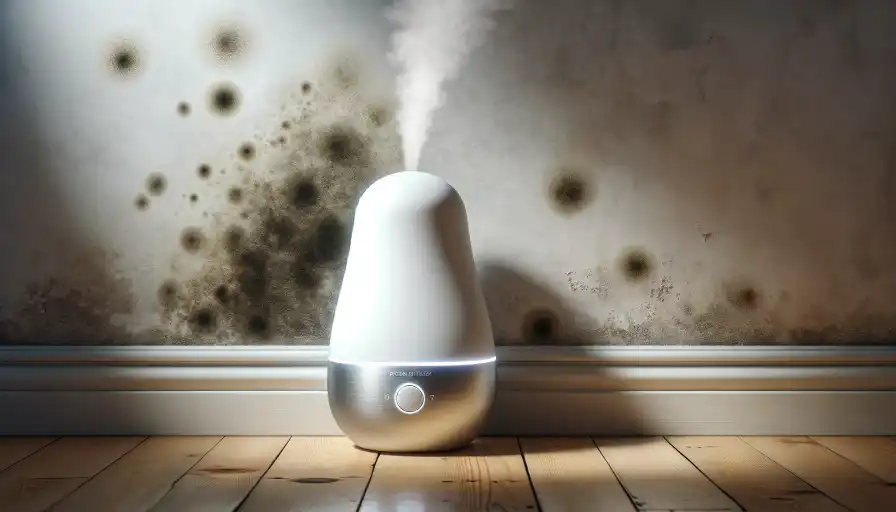Top Essential Oils for Diffusion That Prevent Mold Growth
Can Essential Oil Diffusers Cause Damp or Mold?
Yes, essential oil diffusers can cause dampness and mold growth if they are not used and maintained properly.
Essential oil diffusers work by dispersing oil particles into the air. The moisture generated by diffusers can provide ideal conditions for mold growth. Exposure to mold spores floating in the air can cause health issues for some individuals.
However, research shows that certain essential oils contain natural antifungal and antimicrobial compounds. Using these specially formulated oils in your diffuser can help prevent mold growth.

In this article we will explore the science behind why diffusers develop mold. We also recommend specific essential oils shown to inhibit mold when diffused. Tips for proper usage and cleaning of your diffuser will also be provided.
The goal is to help you enjoy the benefits of fragrant diffused oils while avoiding problems with molded diffusers.
What Causes Mold to Grow in Diffusers?
When essential oils are diffused into the air, some of the oil droplets remain and condense on surfaces inside the diffuser. This creates a moist environment within the diffuser.
Mold spores already exist in normal air. When the spores land on these damp surfaces inside a diffuser, they can grow rapidly into mold colonies.
Some signs that a diffuser has mold growth include:
- Musty, unpleasant smells coming from the diffuser
- Visible fungus or mold spots within the diffuser tank
- Mold growth on the ultrasonic disk or other parts
The warm, humid environment and access to organic matter in the form of diffused oils provides ideal conditions for mold. Other contributing factors can include infrequent cleaning of the diffuser and oils being diffused for too long.
Antimicrobial Properties of Essential Oils
Many essential oils contain powerful plant compounds that have antimicrobial effects. Certain compounds give the oils antifungal and antibacterial properties that can inhibit mold growth.
For example, tea tree essential oil contains terpenes like terpinen-4-ol. Research studies have found terpinen-4-ol is effective against a variety of mold species including Aspergillus niger and Fusarium oxysporum.
Cinnamon oil contains cinnamaldehyde which has been shown to stop mold growth. Clove oil contains eugenol which disrupts the cell membranes of mold. Thyme oil contains thymol that damages mold at a cellular level.
Other oils like lemongrass, thyme, and eucalyptus also contain antifungal plant compounds according to research. Diffusing these oils can create an environment unfavorable to mold growth.
Best Antifungal Oils to Use in Your Diffuser
Based on research of their antimicrobial efficacy, the following essential oils are recommended for diffusion to prevent mold growth:
Tea Tree Oil
- Contains terpinen-4-ol effective against mold species
- Use up to 30 drops in diffuser depending on size
- Diffuse for 30-60 minutes at a time
Cinnamon Oil
- Cinnamaldehyde inhibits mold growth
- Use 3-5 drops diluted in a carrier oil
- Diffuse for short periods due to potency
Clove Oil
- Eugenol disrupts mold cell membranes
- Use 2-3 drops in diffuser diluted
- Diffuse for 20-30 minutes at a time
Thyme Oil
- Thymol damages mold cells
- Use 3-6 drops in diffuser as needed
- Diffuse for 30 minute intervals
Lemongrass Oil
- Citral and geraniol fight mold
- Use up to 15 drops diluted in diffuser
- Diffuse for 30-60 minutes maximum
Eucalyptus Oil
- Antifungal terpenes like eucalyptol
- Use up to 15 drops in diffuser
- Diffuse for short periods due to strength
Safe Usage and Diffuser Maintenance
When using essential oils specifically for their antimicrobial effects, proper usage and diffuser maintenance is important. Here are some tips:
- Always dilute strong oils like cinnamon, clove, and eucalyptus in a carrier oil before diffusing
- Follow recommended diffusion times and oil amounts
- Clean your diffuser regularly according to manufacturer instructions
- Rinse and wipe down all diffuser parts with rubbing alcohol or vinegar water
- Soak diffuser bases in a 50/50 vinegar and water solution for 30 minutes
- Replace used water daily to avoid mold growth
- Periodically deep clean the diffuser with hydrogen peroxide or baking soda
- Allow diffuser to air dry fully between uses
- Consider alternating antimicrobial oils to avoid resistance
Proper care and usage habits will help prevent build up of mold spores. Be sure to monitor your diffuser closely for any signs of mold. Discontinue use if mold persists despite preventive measures.
Benefits of Preventing Mold in Diffusers
Taking steps to prevent mold growth provides several benefits:
- Improved indoor air quality – Eliminating mold spores helps keep the air clean and breathable
- Avoid health issues – Prevents exposure to mold allergens and mycotoxins
- Longer diffuser lifespan – Less mold damage keeps diffusers working optimally longer
- Better absorption of oils – Antimicrobial compounds are not degraded by mold
- Peace of mind – No need to worry about unknowingly diffusing in moldy device
- Pleasant aromatherapy experience – No foul mold odors, just lovely diffused fragrances
Taking a few precautions with cleaning and oils can make a big difference. Breathe easier knowing your diffuser and home air is mold-free.
And finally, here is a draft conclusion section:
Conclusion
Essential oil diffusers provide aromatherapy benefits but can also harbor mold growth. Using antimicrobial essential oils along with proper cleaning and maintenance can prevent mold. Make sure to use oils like clove, thyme, and tea tree known to inhibit mold.
Follow usage tips and clean your diffuser regularly. This will allow you to unlock all the benefits of fragrant diffused oils without problems of molded devices.
Your diffuser and air will remain fresh and mold-free.
